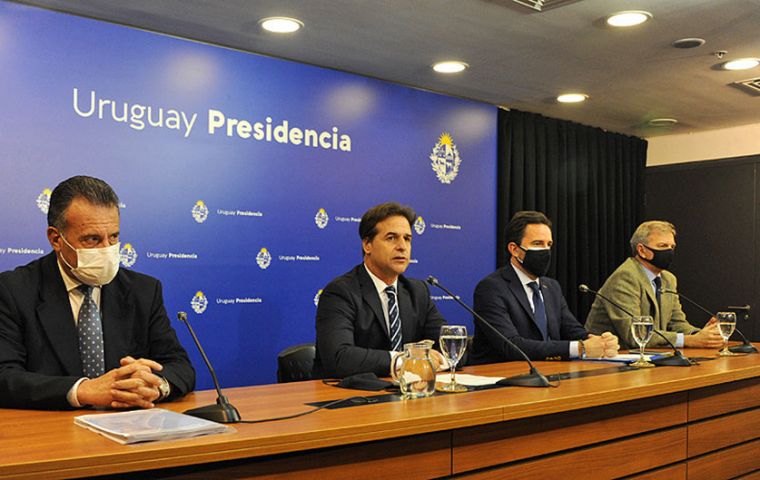MercoPress. South Atlantic News Agency
Argentine plans opening of land borders as Uruguay gets ready to allow tourists in, among many improvements
 Lacalle Pou hinted restrictions could be lifted once “herd immunity is reached”
Lacalle Pou hinted restrictions could be lifted once “herd immunity is reached” Uruguay will start allowing foreigners in as of September 1 while Argentina announced the reopening of its common land borders is being eyed for September 6, as tourism seems headed for a gradual return to pre-pandemic levels.
Argentina's National Migrations Director Florencia Carignano explained Monday the international crossings will enforce a sanitary protocol similar to the one at the Ezeiza airport and that the measure will also include paths to and from Chile.
“As of September 6, we are thinking of opening the land borders with Uruguay and Chile,” Carignano said in a radio interview. “And if we want to expand the number of travelers, we have to count on the provinces,” she added.
Argentina's land borders were closed on March 16, 2020, four days before the quarantine was established due to the first wave of the coronavirus and were only reopened for Argentine citizens or residents who had traveled to those bordering countries before December 25, 2020 to be able to return. But all land borders were closed again on March 29, 2021 due to the increase in COVID-19 cases.
Carignano also mentioned other airports would be allowed soon to allow flights from abroad. But “the isolation conditions remain the same.” So far, only three Argentine provinces mandate incoming travelers to isolate at hotels - Buenos Aires, Salta and San Juan, while Córdoba is considering the option as well as tightening controls on passengers arriving through security corridors. Córdoba suffered a spread of the Delta variant last week after an infected traveler from Peru skipped the 10-day quarantine.
“In the five weeks that we placed restrictions on travelers, we managed to apply more than 12 million vaccines,” said Carignano, who insisted on a change of behavior on the part of travelers returning from abroad.
Meanwhile, Uruguay is opening its borders to foreigners as well as allowing the return of football fans to stadiums, dance parties, weddings and 15th birthday celebrations.
Uruguayan President Luis Lacalle Pou Monday said he was pleased with how his administration had managed the pandemic, but he'd rather “knock on wood,” although nothing in the current scenario would indicate the reopening plan could fall apart.
Lacalle also told reporters that “in the medium term” the health emergency decreed on March 13, 2020 could be lifted, as he highlighted the drop in the number of COVID-19 infections, hospitalizatioons and deaths.
The head of state also underscored that 65% of Uruguayans have already received both doses of vaccine while 73% were inoculated with the first, so that lifting sanitary restrictions could happen “when herd immunity is reached.” According to the World Health Organization (WHO) this will happen when 75% of the population is immunized.
The first milestone to allow the entry of foreigners is September 1, when those who have real estate properties and have also completed their vaccination treatment would be let through the borders, although they will be required to test negative for Sars-Cov-2.
For family groups from countries were vaccination of children has not yet started, Lacalle explained that Uruguay was considering vaccinating them for free. Nevertheless, these groups would still have to observe a mandatory quarantine.
Starting Novermber 1, all foreigners will be granted entry into the country as long as they have had two doses of coronavirus vaccine and a negative PCR test.
Uruguayan authorities also announced Monday that Argentines vaccinated with Sputnik V will be eligibile for entry even though that drug has not yet been approved by the World Health Organization (WHO). In fact, Uruguay uses Sinovac, which also lacks a WHO green light.
Uruguay's Undersecretary of Public Health José Luis Satdjian explained that “we are going to accept them” and explained that it was a sensitive issue to be resolved thinking about the summer tourist season.
Meanwhile, Uruguay's consulate in Buenos Aires is receiving constant enquiries regarding the admission reequirements and also processing over 600 monthly requests requests for permanent residence.
Lacalle Pou also announced Club Atlético Peñarol will be authorized to have an audience in the stands in their upcoming Copa Sudamericana match against the Peruvian team Sporting Cristal.




Top Comments
Disclaimer & comment rules-

Read all commentsSurely Sinovac is approved for emergency use by WHO and has been for some time now. Correct facts are important these days.
Aug 10th, 2021 - 10:12 am 0Commenting for this story is now closed.
If you have a Facebook account, become a fan and comment on our Facebook Page!